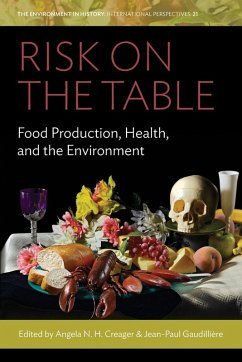Over the last century, the industrialization of agriculture and processing technologies have made food abundant and relatively inexpensive for much of the world's population. Simultaneously, pesticides, nitrates, and other technological innovations intended to improve the food supply's productivity and safety have generated new, often poorly understood risks for consumers and the environment. From the proliferation of synthetic additives to the threat posed by antibiotic-resistant bacteria, the chapters in Risk on the Table zero in on key historical cases in North America and Europe that illuminate the history of food safety, highlighting the powerful tensions that exists among scientific understandings of risk, policymakers' decisions, and cultural notions of "pure" food.
Hinweis: Dieser Artikel kann nur an eine deutsche Lieferadresse ausgeliefert werden.
Hinweis: Dieser Artikel kann nur an eine deutsche Lieferadresse ausgeliefert werden.








